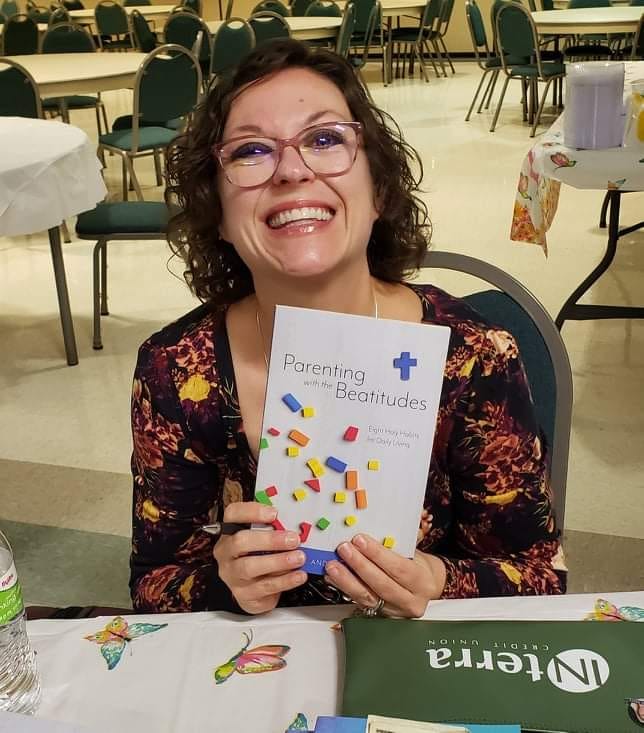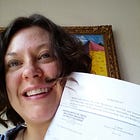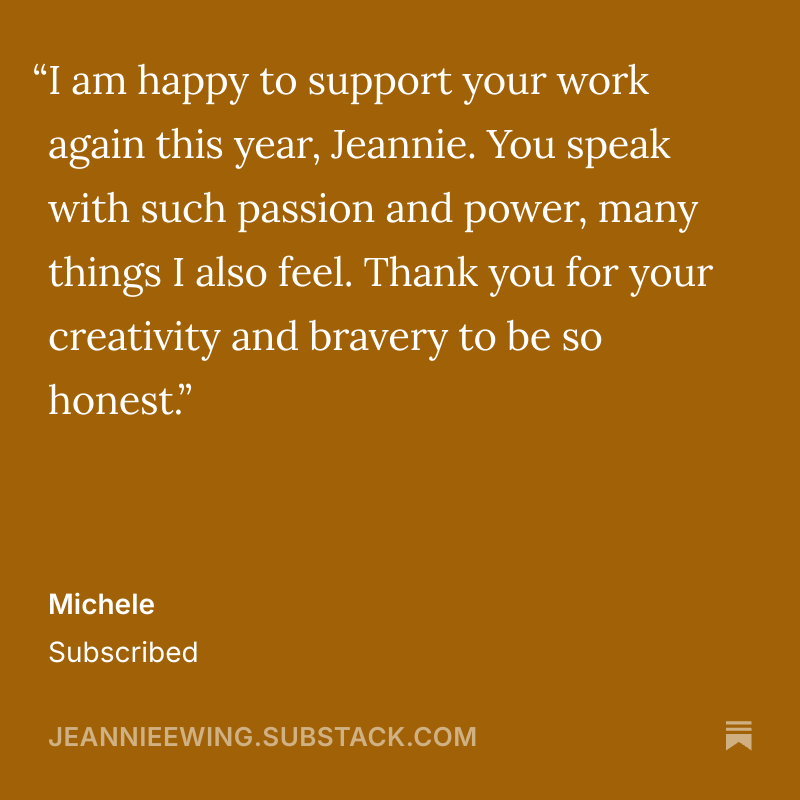What if it's time to start over?
The beginning of questioning whether the Catholic lens was limiting my ability to reach people beyond it.

The thematic element of this month’s posts center around a larger story about how I became an author and why I walked away to start over. I haven’t publicly written or spoken about my creative past—the fact that I once was a branded Catholic grief author who traveled nationwide to speak to the bereaved in workshops and retreats and conferences.
This is the fourth essay. I hope you will stay along for the ride. In today’s piece, I share about the ambivalence I began feeling once I realized that I wasn’t able to be fully transparent in what I was writing for publication.
If you missed last week’s post, you can read it here:
Also, here’s an podcast interview I shared with Aaron Devries on The Inclusive Dad podcast if you’d like to take a listen:
The Next Chapter of my Story
2015-2020
For five solid years, I travel nationwide to speak to the bereaved. It is both an honor and terror for me to enter the worlds of strangers who have suffered unthinkable losses of which I know nothing—which I have never experienced. What can I give to them? What can I say to console them?
I realize quickly, year after year of one-on-one hushed conversations over my book signing table after I’ve given a talk, that people do not want pat answers, like, “It’ll all turn out okay,” or “At least they’re not suffering anymore.” They don’t want to hear that they’re strong or brave when they are falling apart at the seams. They don’t want to know that suffering is inevitable, that we all go through it. They don’t even want to hear that a loving God holds them right now.
What they want is for a person to take their hands, look them in the eyes, and say, “You’re right. This shouldn’t have happened. It’s okay that you’re angry. You’re allowed to ask those questions.” They want presence, not platitudes. They need to know they are seen in their raw expression of sorrow, that what they feel and where they are right now is part of the human experience.
I try to stay with each person who shares their stories with me and listen without judgment or rushing to resolve their discomfort. In fact, I sit with my own restlessness and anxiety while I listen to the expression of theirs. I validate their “I hate God right now” comments whispered out of earshot and hold space for their guttural wails and weeping.
Holding space for sacred sadness, I learn, is not something most people know how to do. It’s not something I was trained to do, yet I do it, because I recognize its significance for someone who has been holding back their very real and very gripping thoughts and feelings—the forbidden ones that they feel ashamed to give voice to.
When I return to my computer and type new articles to submit to the Catholic periodicals I write for, my mind begins to meander back to those conversations, where someone sheepishly asks, “Is it okay if I don’t want anything to do with God?” I know I’m not supposed to bring these questions to light in the articles I submit, because they are too controversial, too close to what might be perceived as apostasy, or rejection of the faith.
Yet it seems to be disingenuous to ignore what I am finding is a common reaction in the wake of devastating loss—to question one’s beliefs, especially one’s religious beliefs, and so I muddle through sending the safe stories that I know won’t be questioned by my editors, because they don’t go into the deep waters of human suffering. They skim the surfaces. They parrot what we’ve been taught is “right,” according to theological doctrines and dogmas.
Over time, I feel unsettled every time I approach a publisher with a new book idea, because I am becoming more unhinged and more honest in my writing. I am sharing the dark secrets of my own experience after Sarah was born, when I, too, was angry with God. When I, too, questioned whether God cared or even existed at all. And who was this God I was raised to worship, anyway? Why would a God like this who is Love Incarnate allow such senseless suffering to exist?
I know the right answer: the Cross is the pathway to our sanctification, and suffering is our avenue for spiritual transformation. But even if this is true, I know I can’t recite it to those whose lives have been annihilated by grief. It seems glib, insensitive, even insulting to do so. After being the recipient of canned and rehearsed comments based on the “happy Catholic narrative,”1 I can’t in conscience dispense the same messages that had so deeply pushed me into feeling alienated from the very community I believed might comfort me. Or, if not comfort, at least support me.
This inner agitation disturbs me, but I don’t know what to do about it. I’ve found a comfortable freelance rhythm within Catholic media and publishing, and the income to go along with it. Yet my heart, day after day, is drawn to those on the fringes of where religion and society at large dare not trod—to the places where the forgotten believe they are nothing and that no one cares enough to walk alongside them.
COVID strikes, and I abruptly lose every speaking engagement lined up for the year, plus several of my sources of income regrettably tell their contributors that they can no longer afford to pay us. Some places I’m writing for fold overnight. I’m in a position now to deeply discern what is happening inside of me and what I can do to change course.
This is where life gets dicey for me: I am unaccustomed to inviting, even welcoming, change, especially when I have a hunch it will mean I need to take a risk into unknown territory—which seems to me, more and more, the direction I’m heading.
I take frequent walks to our neighborhood park, because it is one of the few sanctioned places for outdoor recreation, and I find it a refuge in this time of upheaval and turmoil. While strolling along the walking path, my thoughts wander to this existential crisis bubbling inside of me that will not release its grip: What am I supposed to do?
You’re playing it safe, was the reply I heard, but what? Where did this come from? It was resonant and clear, unmistakably so. Throughout the next two years, I will hear this same message every time I wonder why I am losing the freelance career I’d built: You’re playing it safe.
What I realize over time is this: I have been restricting the message I am meant to share by writing for those who do not need, or want, to hear it. Playing it safe means I continue to regurgitate theologically guarded essays to the people who already believe and just want something to verify that belief.
But what if there’s more? What if the mystery is really where life exists in its fullest state, and I’ve been missing an opportunity to step outside of the structured containers that have held my life captive?
What if venturing into the wilderness might lead me to a deeper truth, one that reverberates to people of any, or no, faith?
What if it’s time for me to start over?
This testimonial originated from my friend Michele, who is one of the few people in my inner circle of family and friends (and there are a few!) who both reads what I write and financially supports the work I do, because she believes in it. More than that, she believes in me. And that is something I recall often, during the times when I question whether what I write matters at all.
If you want presence, not platitudes, and a safe digital space to share your heart, consider upgrading your subscription or adding a tip today. I picture you and I sharing an intimate conversation over our preferred drink of choice (herbal tea for me, please), where I can hold space for your tender stories.







I really loved this so much Jeannie, imagine the world if more souls had the courage to go there and do this: "Yet my heart, day after day, is drawn to those on the fringes of where religion and society at large dare not trod—to the places where the forgotten believe they are nothing and that no one cares enough to walk alongside them." THANK YOU. <3
Jeannie, this piece resonates deeply with me. I was raised Catholic, went to Catholic boarding school, and followed "the path" up until the birth of my third child, when I started to understand I had a lot of feelings about my faith that had been simmering for years. Still, it took me a few more years to reach breaking point. It came after we moved to a new city and I was looking to sign my oldest up for First Communion preparation. Basically, the requirements -- returning for First Communion class on Sunday afternoon AFTER mass and Sunday school -- struck me as so family UNfriendly that I refused to do any of it. I barely recognized myself, but those feelings were real. I had so much resentment at feeling like I had to "prove" my faith with class after class for every sacrament, for me and my children. How does one go to church their whole life and show up as faithful, and it still not be enough to say, "I'd like to have my child baptized," without having to take another class? I had too many questions and was over it. Done. And free. I embraced what I've always known in my heart; my religion is human connection, kindness, and a belief that there is something bigger than us, something beyond our human lives, and that our purpose here pretty much boils down to learning how to love each other. It doesn't need a name, it doesn't exclude, shame, or judge. I guess you struck a chord with this piece! I thank you for your vulnerability and honesty in your writing, and I'm very grateful I discovered you here.❤️